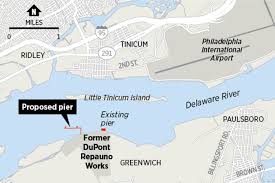FROM AN ARTICLE BY JON HURDLE, NEW JERSEY SPOTLIGHT, MARCH 4, 2020
Trial-like proceeding will hear all sides and recommend whether to uphold Delaware River Basin Commission’s approval.
The Delaware River Basin Commission has set up a quasi-judicial hearing on a controversial plan to build New Jersey’s first liquefied natural gas export terminal on the Delaware River, giving opponents a high-profile opportunity to reargue their case almost a year after the project was approved by the interstate water regulator.
The DRBC said the hearing, due to start on April 15 in Mercerville, will include testimony by the project’s developer, Delaware River Partners (DRP) as well as commission staff, and the environmental group Delaware Riverkeeper Network (DRN), which opposes the project and called last July for a rehearing.
“This announcement is a stunning admission that the DRBC failed to provide a full or fair opportunity for public comment before approving the Gibbstown Logistics LNG export facility,” said Delaware Riverkeeper Network leader Maya van Rossum, in a statement.
The “adjudicatory hearing,” a trial-like proceeding that will include direct- and cross-examination of witnesses by all sides, will take place before a hearing officer — an official from the Pennsylvania Department of State — who will later recommend to the commission whether to uphold or reject its approval of the project last June. The commission will be under no obligation to accept the recommendation.
Some seats will be made available for the public to attend the hearing but the public will not be allowed to speak, the DRBC said.
Former DuPont site in Gloucester County, NJ
Delaware Riverkeeper Network previously argued that the commission didn’t allow nearly enough time for the public to comment on the proposal, which would build a 43-feet deep berth on a former DuPont site at Gibbstown on the Delaware River in Gloucester County. The project would make space for two oceangoing tankers to ship LNG that would be carried by rail from the gas-rich reserves of the Marcellus Shale in northeastern Pennsylvania.
Under an earlier plan, the fuel was to be shipped to Gibbstown in hundreds of trucks. But in December, the federal pipeline regulator, the Pipeline and Hazardous Materials Safety Administration, approved the use of trains to carry LNG from Wyalusing, PA to Gibbstown, the first route in the nation where shipment of LNG by rail would be allowed. It is unclear whether there will be any truck shipments.
Other fuels that would be shipped via the $95 million dock include butane, ethane, propane and liquefied petroleum gas (LPG). There will be no bulk storage and no manufacturing of any of the liquids at the site, DRBC said.
The proposed terminal would be an addition to Dock 1, a deep-water berth on the same site for multipurpose freight shipping such as automobiles and break-bulk cargo (not shipped in containers), that was substantially completed in December 2018.
Issues of public and environmental safety
Delaware Riverkeeper Network and other critics argue that the project would be a risk to public safety because of the highly explosive nature of super-cooled natural gas to be transported in rail tankers about 175 miles through many densely populated areas. They also say it would endanger the health of the Delaware River, and increase demand for fracked gas amid efforts by New Jersey and many other states to reduce their dependence on climate-altering fossil fuels. The environmental group said the hearing announcement shows DRBC now recognizes that it should have given the public more opportunity to comment before approving the project.
Delaware Riverkeeper Network leader van Rossum said it should not have been necessary for her organization to file a legal challenge and obtain expert reports — which will be presented at the hearing — to challenge the DRBC’s approval.
Kate Schmidt, a spokeswoman for DRBC, said the commission gave 14 days’ notice of a June 6, 2019 public hearing on whether to approve the project, more than the 10 days required by commission rules, and written comment was accepted until June 7. The commission approved the project on June 12.
After the upcoming hearing, the hearing officer will submit his findings and recommendations, based on hearing testimony and public written comments, which must be received by April 24, Schmidt said.
‘Highly unusual’ move to reopen case
Doug O’Malley, director of Environment New Jersey, said that reopening the public debate over the project was a “highly unusual” move that reflected an inadequate comment period before the approval was issued.
“Better late than never to have a more open public-comment process, but it’s a reflection that the public didn’t get an adequate opportunity to weigh in previously,” he said. “It was a very rushed process that followed the letter of the law but did not follow the spirit.”
Airing the issues before a hearing officer will provide “a measure of independence” to the process, said O’Malley, whose organization also opposes the plan. Even though the commission is not required to accept the hearing officer’s recommendations, any conclusion that the terminal should not go ahead would send a “very powerful message” to the DRBC, he said.
In June last year, the project needed permits from the New Jersey Department of Environmental Protection, the U.S. Army Corps of Engineers, the U.S. Coast Guard, Gloucester County, and Greenwich Township, the DRBC said.
>>>>>>>>>>>>>>>>>>>>>>>>>>>>>>>>>
See also: Delaware Riverkeeper appeals state permit for LNG project in Gibbstown, Cherry Hill Courier Post, October 21, 2019
A coalition of environmental groups is fighting plans to ship LNG (liquefied natural gas) from Repauno Port & Rail Terminal on the Delaware River in Greenwich Township. Formerly owned by DuPont Company, the site is now under development by New Fortress Energy and Delaware River Partners as a rail terminal and deep-water port.

